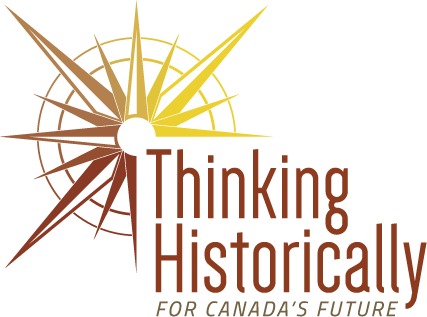Meaningful Engagement: Reflections on Scholarly Community in Troubled Times
by Mallory Davies, PhD Candidate, University of Waterloo
The History Education in Troubled Times workshop came at a productive time to meet with colleagues and served as a strong reminder of the importance of supportive communities and meaningful engagement. Here I reflect on my experiences during the first day of the workshop, which involved the authors of chapters in the edited collection. The “Troubled Times” in this collection meant making sense of the pressing issues of our current times by discussing how to teach and understand the past. All authors were responsible for pre-reading at least one chapter and providing verbal feedback to those authors. We were also responsible for presenting our own chapters and engaging in discussion about our ideas.

Day One at the History Education in Troubled Times Workshop (Photo by Sara Karn).
I was profoundly affected by the workshop and the opportunity to engage with colleagues. As a late-stage PhD candidate, I have been working in solitude for the past seven months. As I emerged from my writing silo to participate in this workshop, I was reminded of the importance of in-person interactions and how they can lift one up. Such interactions resulted in helpful feedback, a far more intimate and supportive environment compared to academic conferences, and encouragement in my work outside of the workshop. My reflections on the workshop weekend highlight the importance of scholarly community.
Since before the COVID-19 pandemic, feedback on scholarly work has primarily been in the form of track changes and comments left by peers. Digital feedback is often the easiest way to provide feedback, especially with colleagues worldwide. In the workshop setting, I found that it was helpful to listen to verbal feedback from other authors and reciprocate such feedback. It was beneficial to hear how others perceived our work, rather than through digital means that sometimes lack emotion, connection, or meaning. It was refreshing to gather supportive comments, but also to understand where important aspects of our analysis may need clarification and refinement. I found this relational approach to giving feedback informative and supportive to the peer review process.
Besides receiving verbal feedback, I found an intimate workshop provided stronger connections and mentorship opportunities with colleagues, compared to other networking opportunities such as conferences. Conferences are undoubtedly an important place to share scholarly work and meet with colleagues. Yet, these interactions are too often rushed over while grabbing a coffee and snack in between sessions. In this smaller gathering, I felt I could hold meaningful conversations and listen to various strategies my colleagues have used in the classroom and in their own writing. This was especially helpful because I’ve been contemplating making various changes to my own writing and teaching style.
My conversations with colleagues were encouraging for my own research processes outside of this workshop. Colleagues were curious about where I was in my dissertation writing journey. I recall feeling embarrassment prior to the workshop for taking what I thought was too much time with my own work, and I was dreading telling my peers about my delay. However, I was met with encouragement and support, receiving many suggestions on how to navigate the muddy waters of writing. After this conference, I was so motivated to get back to work and implement some new ideas and strategies. It was also humbling to discuss and interact with academics in the field who shared their own stories of difficult periods of writing.
The Troubled Times workshop came at such a crucial time as I was becoming disengaged from my own writing and research processes. I had not expected to be profoundly affected by this experience, but I was far more reflective and inspired at the end of the workshop. As a doctoral candidate, this workshop was a stark reminder of the importance of meaningful interaction with colleagues and friends, and how many in academic spaces are prepared to support each other with kind critiques and suggestions.
Mallory Davies is a PhD Candidate in the Tri-History Graduate Program at the University of Waterloo. Her dissertation research focuses on the history of education for teen mothers in Calgary, Alberta and Canada more broadly. Mallory is a research assistant with the ‘Thinking Historically for Canada’s Future Project,’ where she focuses on historical thinking and civic engagement. Her research interests include the history of education, gender and sexuality, reproductive justice, and history and citizenship education.
